Many sweetened beverages sold at hand-shaken tea shops contain excessive amounts of added sugars that often exceed the recommended daily amount for adults, a survey released yesterday by the John Tung Foundation showed.
The survey found that the actual sugar and calories contained in beverages are often much higher than the totals claimed by businesses, as calories from added sugar and toppings are not taken into account.
The foundation from January to March examined 169 types of beverages sold at 55 branch stores operated by 22 hand-shaken tea chains in Taipei.

Photo: Lin Hui-chin, Taipei Times
Added sugars should not make up more than 10 percent of the total daily calorie intake, according to the Health Promotion Administration’s national dietary guidelines for adults, so a person who consumes 2,000 calories per day should not consume more than 200 calories of added sugars, which is equivalent to about 50g of sugar, foundation nutritionist Yu Hsuan-wen (尤宣文) said.
The foundation’s Food and Nutrition Center director Pan Chi-luen (潘紀綸) said the survey found that the beverage with the highest added sugar content was a honey lemonade with an aloe vera topping, which Pan said is often considered a healthy drink, but contains 86g of sugar per 500ml.
The second-highest was a brown sugar smoked plum juice with honey lemonade, which has 80g of sugar per 500ml, followed by iced sweetened hibiscus tea, with 63.7g of sugar per 500ml, the survey found.
While many shops list the sugar and calorie content of the beverages, Food and Drug Administration (FDA) regulations do not require them to list the calories from toppings, such as tapioca pearls, taro balls, aloe vera, grass jelly and beans, which are prepared in sugar or syrup, Pan said.
The survey found that the actual sugar and calorie content of the beverages ranged from 2.2 to 6.9 times the amounts disclosed on labels.
For example, a cup of tapioca milk tea with red beans was said to contain 10 calories per 100ml, but the foundation discovered that it contained 69.1 calories per 100ml, Pan said.
The foundation urged the FDA to require beverage shops to include the calories from added sugar and toppings in the nutritional information for the beverages.
Some people drink a cup of hand-shaken tea as a meal to avoid excessive calorie intake, but sweetened beverages have limited nutritional value, Yu said, urging people to drink non-sweetened beverages and more water to reduce sugar intake.

Taiwanese can file complaints with the Tourism Administration to report travel agencies if their activities caused termination of a person’s citizenship, Mainland Affairs Council Minister Chiu Chui-cheng (邱垂正) said yesterday, after a podcaster highlighted a case in which a person’s citizenship was canceled for receiving a single-use Chinese passport to enter Russia. The council is aware of incidents in which people who signed up through Chinese travel agencies for tours of Russia were told they could obtain Russian visas and fast-track border clearance, Chiu told reporters on the sidelines of an event in Taipei. However, the travel agencies actually applied

New measures aimed at making Taiwan more attractive to foreign professionals came into effect this month, the National Development Council said yesterday. Among the changes, international students at Taiwanese universities would be able to work in Taiwan without a work permit in the two years after they graduate, explainer materials provided by the council said. In addition, foreign nationals who graduated from one of the world’s top 200 universities within the past five years can also apply for a two-year open work permit. Previously, those graduates would have needed to apply for a work permit using point-based criteria or have a Taiwanese company

The Shilin District Prosecutors’ Office yesterday indicted two Taiwanese and issued a wanted notice for Pete Liu (劉作虎), founder of Shenzhen-based smartphone manufacturer OnePlus Technology Co (萬普拉斯科技), for allegedly contravening the Act Governing Relations Between the People of the Taiwan Area and the Mainland Area (臺灣地區與大陸地區人民關係條例) by poaching 70 engineers in Taiwan. Liu allegedly traveled to Taiwan at the end of 2014 and met with a Taiwanese man surnamed Lin (林) to discuss establishing a mobile software research and development (R&D) team in Taiwan, prosecutors said. Without approval from the government, Lin, following Liu’s instructions, recruited more than 70 software

Taiwanese singer Jay Chou (周杰倫) plans to take to the courts of the Australian Open for the first time as a competitor in the high-stakes 1 Point Slam. The Australian Open yesterday afternoon announced the news on its official Instagram account, welcoming Chou — who celebrates his 47th birthday on Sunday — to the star-studded lineup of the tournament’s signature warm-up event. “From being the King of Mandarin Pop filling stadiums with his music to being Kato from The Green Hornet and now shifting focus to being a dedicated tennis player — welcome @jaychou to the 1 Point Slam and #AusOpen,” the